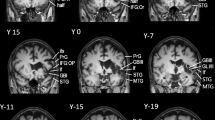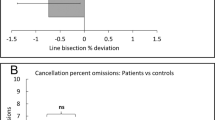Abstract
Findings concerning cognitive impairment in patients with focal cerebellar lesions tend to be inconsistent and usually reflect a mild deficit. Patient variables such as lesion age and the age at lesion onset might affect functional reorganization and contribute to the variability of the findings. To assess this issue, 14 patients with focal vascular cerebellar lesions and 14 matched healthy control subjects performed a verbal working memory and a verbal long-term memory task as well as verbal fluency tasks. Patients showed deficits in working memory and verbal fluency, while recall of complex narrative material was intact. Verbal fluency performance correlated significantly with age in the patient group, with more severe impairments in older patients, suggesting that age at lesion onset is a critical variable for cognitive outcome. In controls, no significant correlations with age were observed. Taken together, our findings support the idea of cerebellar involvement in nonmotor functions and indicate the relevance of interindividual differences in regard to clinical parameters after focal cerebellar damage.




Similar content being viewed by others
References
Bellebaum C, Daum I. Cerebellar involvement in executive control. Cerebellum. 2007;6:184–92.
Ben-Yehudah G, Guediche S, Fiez JA. Cerebellar contributions to verbal working memory: beyond cognitive theory. Cerebellum. 2007;6:193–201.
Fiez JA, Petersen SE, Cheney MK, Raichle ME. Impaired non-motor learning and error detection associated with cerebellar damage. Brain. 1992;115:155–78.
Middleton FA, Strick PL. Anatomical evidence for cerebellar and basal ganglia involvement in higher cognitive function. Science. 1994;266:458–61.
Richter S, Gerwig M, Aslan B, Wilhelm H, Schoch B, Dimitrova A, et al. Cognitive functions in patients with MR-defined chronic focal cerebellar lesions. J Neurol. 2007;254(9):1193–203.
Molinari M, Leggio MG, Silveri MC. Verbal fluency and agrammatism. In: Schmahmann JD, editor. The cerebellum and cognition. International review of neurobiology, vol. 41. San Diego: Academic; 1997.
Silveri MC, Di Betta AM, Filippini V, Leggio MG, Molinari M. Verbal short-term store-rehearsal system and the cerebellum. Evidence from a patient with a right cerebellar lesion. Brain. 1998;121:2175–87.
Ravizza SM, McCormick CA, Schlerf JE, Justus T, Ivry RB, Fiez JA. Cerebellar damage produces selective deficits in verbal working memory. Brain. 2006;129:306–20.
De Ribaupierre S, Ryser C, Villemure J-G, Clarke S. Cerebellar lesions: is there a lateralisation effect on memory deficits? Acta Neurochir Suppl (Wien). 2008;150:545–50.
Grafman J, Litvan I, Massaquoi S, Stewart M, Sirigu A, Hallett M. Cognitive planning deficit in patients with cerebellar atrophy. Neurology. 1992;42(8):1493–6.
Thoma P, Bellebaum C, Koch B, Schwarz M, Daum I. The cerebellum is involved in reward-based reversal learning. Cerebellum. 2008;7(3):433–43.
Drepper J, Timmann D, Kolb FP, Diener HC. Non-motor associative learning in patients with isolated degenerative cerebellar disease. Brain. 1999;122:87–97.
Gottwald B, Wilde B, Mihailovic Z, Mehdorn HM. Evidence for distinct cognitive deficits after focal cerebellar lesions. J Neurol Neurosurg Psychiatry. 2004;75:1524–31.
Townsend J, Courchesne E, Covington J, Westerfield M, Harris NS, Lyden P, et al. Spatial attention deficits in patients with acquired or developmental cerebellar abnormality. J Neurosci. 1999;19(13):5632–43.
Golla H, Thier P, Haarmeier T. Disturbed overt but normal covert shifts of attention in adult cerebellar patients. Brain. 2005;128:1525–35.
Ackermann H, Mathiak K, Riecker A. The contribution of the cerebellum to speech production and speech perception: clinical and functional imaging data. Cerebellum. 2007;6:202–13.
Baillieux H, De Smet HJ, Paquier PF, De Deyn PP, Mariën P. Cerebellar neurocognition: insights into the bottom of the brain. Clin Neurol Neurosurg. 2008;110(8):763–73.
Schmahmann JD, Weilburg JB, Sherman JC. The neuropsychiatry of the cerebellum—insights from the clinic. Cerebellum. 2007;6:254–67.
Riecker A, Ackermann H, Wildgruber D, Dogil G, Grodd W. Opposite hemispheric lateralization effects during speaking and singing at motor cortex, insula and cerebellum. NeuroReport. 2000;11:1997–2000.
Allen G, Buxton RB, Wong EC, Courchesne E. Attentional activation of the cerebellum independent of motor involvement. Science. 1997;275:1940–3.
Awh E, Jonides J, Smith EE, Schumacher EH, Koeppe RA, Katz S. Dissociation of storage and rehearsal in verbal working memory: evidence from positron emission tomography. Psychol Sci. 1996;7:25–31.
Jonides J, Schumacher EH, Smith EE, Lauber EJ, Awh E, Minoshima S, et al. Verbal working memory load affects regional brain activation as measured by PET. J Cogn Neurosci. 1997;9:462–75.
Paulesu E, Frith CD, Frackowiak RS. The neural correlates of the verbal component of working memory. Nature. 1993;362(6418):342–5.
Desmond JE, Gabrieli JDE, Wagner AD, Ginier BL, Glover GH. Lobular patterns of cerebellar activation in verbal working-memory and finger-tapping tasks as revealed by functional MRI. J Neurosci. 1997;17(24):9675–85.
Chen S, Desmond J. Cerebrocerebellar networks during articulatory rehearsal and verbal working memory tasks. Neuroimage. 2005;24:332–8.
Chen S, Desmond J. Temporal dynamics of cerebro-cerebellar network recruitment during a cognitive task. Neuropsychologia. 2005;43:1227–37.
Frank B, Schoch B, Richter S, Frings M, Karnath H-O, Timmann D. Cerebellar lesion studies of cognitive function in children and adolescents—limitations and negative findings. Cerebellum. 2007;6:242–53.
Braun M, Finke C, Ostendorf F, Lehmann T-N, Hoffmann K-T, Ploner CJ. Reorganization of associative memory in humans with long-standing hippocampal damage. Brain. 2008;131:2742–50.
Lidzba K, Wilke M, Staudt M, Krägeloh-Mann I, Grodd W. Reorganization of the cerebro-cerebellar network of language production in patients with congenital left-hemispheric brain lesions. Brain Lang. 2008;106(3):204–10.
Tillema JM, Byars AW, Jacola LM, Schapiro MB, Schmithorst VJ, Szaflarski JP, et al. Cortical reorganization of language functioning following perinatal left MCA stroke. Brain Lang. 2008;105(2):99–111.
Lucas 2nd TH, Drane DL, Dodrill CB, Ojemann GA. Language reorganization in aphasics: an electrical stimulation mapping investigation. Neurosurgery. 2008;63(3):487–97.
Karbe H, Thiel A, Weber-Luxenburger G, Herholz K, Kessler J, Heiss WD. Brain plasticity in poststroke aphasia: what is the contribution of the right hemisphere? Brain Lang. 1998;64(2):215–30.
Warburton E, Price CJ, Swinburn K, Wise RJ. Mechanisms of recovery from aphasia: evidence from positron emission tomography studies. J Neurol Neurosurg Psychiatry. 1999;66(2):155–61.
Kokotilo KJ, Eng JJ, Boyd LA. Reorganization of brain function during force production after stroke: a systematic review of the literature. J Neurol Phys Ther. 2009;33(1):45–54.
Haarmeier T, Thier P. The attentive cerebellum—myth or reality? Cerebellum. 2007;6:177–83.
Matsui, T., Hirano, As. An atlas of the human brain for computerized tomography/Takayoshi Matsui, Asao Hirano; with a foreword by H.M. Zimmerman, Tokyo: Igaku-Shoin 1978.
Thoma P, Koch B, Heyder K, Schwarz M, Daum I. Subcortical contributions to multitasking and response inhibition. Behav Brain Res. 2008;194:214–22.
Dahl G. Reduzierter Wechsler Intelligenztest (short version of the Wechsler Intelligence Scale). München: Hain; 1972.
Zimmermann P, Fimm B. Testbatterie zur Aufmerksamkeitsprüfung (TAP). Version 1.02c. Freiburg: Psytest; 1993.
Härting C, Markowitsch HJ, Neufeld H, Calabrese P, Deisinger K, Kessler J, editors. WMS-R. Wechsler Gedächtnistest—revidierte Fassung. Manual. Deutsche Adaptation der revidierten Fassung der Wechsler Memory Scale von David Wechsler. Bern: Verlag Hans Huber; 2000.
Daum I, Reimold C, Spieker S. Kognitive Beeinträchtigungen im Frühstadium der Parkinsonschen Krankheit—Eine explorative Studie an 18 unmedizinierten de novo Patienten. Zeitschrift für Gerontopsychologie und—Psychiatrie. 1994;7(2):85–94.
Robert PH, Lafont V, Medecin I, Berthet L, Thauby S, Baudu C, et al. Clustering and switching strategies in verbal fluency tasks: comparison between schizophrenics and healthy adults. J Int Neuropsychol Soc. 1998;4(6):539–46.
Crawford JR, Garthwaite PH. Investigation of the single case in neuropsychology: confidence limits on the abnormality of test scores and test score differences. Neuropsychologia. 2002;40:1196–208.
Crawford JR, Howell DC. Comparing an individual's test score against norms derived from small samples. Clin Neuropsychol. 1998;12:482–6.
Wager TD, Smith EE. Neuroimaging studies of working memory: a meta-analysis. Cogn Affect Behav Neurosci. 2003;3(4):255–74.
Ziemus B, Baumann O, Luerding R, Schlosser R, Schuierer G, Bogdahn U, et al. Impaired working-memory after cerebellar infarcts paralleled by changes in BOLD signal of a cortico-cerebellar circuit. Neuropsychologia. 2007;45(9):2016–24.
Schmahmann JD, Sherman JC. The cerebellar cognitive and affective syndrome. Brain. 1998;121:561–79.
Hokkanen LSK, Kauranen VO, Roine RO, Salonen O, Kotila M. Subtle cognitive deficits after cerebellar infarcts. Eur J Neurol. 2006;13:161–70.
Daum I, Ackermann H, Schugens MM, Reimold C, Dichgans J, Birbaumer N. The cerebellum and cognitive functions in humans. Behav Neurosci. 1993;107(3):411–9.
Stoodley CJ, Schmahmann JD. Functional topography in the human cerebellum: a meta-analysis of neuroimaging studies. Neuroimage. 2009;44:489–501.
Exner C, Weniger G, Irle E. Cerebellar lesions in the PICA but not SCA territory impair cognition. Neurology. 2004;63:2125–32.
Levisohn L, Cronin-Golomb A, Schmahmann JD. Neuropsychological consequences of cerebellar tumour resection in children: cerebellar cognitive affective syndrome in a paediatric population. Brain. 2000;123:1041–50.
Acknowledgement
This research was supported by the German Research Society (DFG, Da 259/9-1).
Conflict of Interest
Herewith, the authors declare that there is no actual or potential conflict of interest including any financial, personal or other relationships with other people or organizations that could inappropriately influence or be perceived to influence the present work.
Author information
Authors and Affiliations
Corresponding author
Rights and permissions
About this article
Cite this article
Peterburs, J., Bellebaum, C., Koch, B. et al. Working Memory and Verbal Fluency Deficits Following Cerebellar Lesions: Relation to Interindividual Differences in Patient Variables. Cerebellum 9, 375–383 (2010). https://doi.org/10.1007/s12311-010-0171-z
Published:
Issue Date:
DOI: https://doi.org/10.1007/s12311-010-0171-z




